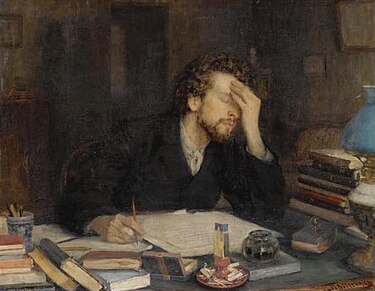
The Passion of Creation , Pasternak courtesy of wikipedia.org
“I think my mind just exploded.” Those were a subscriber’s words after reading my blog, The Time Travelers.
I knew the compliment didn’t refer to my writing skills. It was a response to the content. The topic was about advances in science and Artificial Intelligence. (AI). I admit the ideas I conveyed were mind-boggling, and proved that we live in a miraculous world. Nonetheless, these truths pale in comparison to the spectacular claims of those who deal in alternate facts–made-up stuff that can also be jaw-dropping.
Our 45th President Donald Trump invented whoppers faster than water can pour from a spigot. Sometimes his claims were designed to save his skin. Sometimes, I suspect, he invented them for fun. His most celebrated lie was about the 2020 election, the one where he insisted he defeated Joe Biden. He’s repeated that claim for so long, that for some, it has the ring of truth.
He’s not the only politician with a penchant for spreading disinformation. Without political lies, the history books would be half their size. Robert F. Kennedy Jr, a Presidential candidate in the 2024 election is doing his best to keep that shrinkage from happening. For years, he’s been misinforming the public about the danger of vaccines.
Politicians aren’t alone in their use of alternative facts. Book marketers rely on them too. I began my blog series in 2010 with a list of websites dedicated to helping writers avoid pitfalls in the industry. Today, one exists.
In a The New York Times article, freelance writer Sophie Vershbow reveals tricks for getting a book on that paper’s Best Sellers list. The editors insist they avoid having their numbers manipulated with a formula as well-guarded as the one for Coca-Cola. Vershbow shrugs at the disclaimer, however, then proves them wrong by exposing the many triumphants of human ingenuity.
One strategy involves preorders. A book’s sale data gets collected as a block number, which means presales are counted on the day the work is published. A book scheduled to launch in November can count on presale figures to bump up its numbers in the first week of publication. The boost lasts only for the week, but if the numbers are high enough to make the best-seller list, the author can don the mantle of a “best-selling author” in perpetuity, no matter the legion of dogs that follow.
Writers on a paid speaking circuit have another ploy. They can negotiate the purchase of books into their honorarium package instead of a standard speaking fee, says Vershbow. In addition, “sales” can be channeled through a reporting source—like an independent bookstore. That way, authors not only escape the stigma of a single-source purchase but also the need to skulk through the dark of night to deposit their books at homeless camps like unloved zucchini.
Writers with deep pockets can chuck the subterfuge and put their books in the hands of promoters. Book Highlight, for example, specializes in “best-seller” campaigns.
A woman on my Facebook page announced she was going dark to write her first novel. If Jean Auel could earn $9 million with her pen, the woman assumed she could do the same. I wished her well but warned the cost of publishing a book can exceed earnings. Cold water isn’t what a dreamer wants to hear, I know, so no doubt my comment fell on infertile ground. For scammers, there’s an upside. They live on the obdurate hopes of writers.
And who knows? My Facebook friend could be another Jean Auel. Yet I can’t help thinking that if money and not the joy of writing is her motivation, she’d do better to buy a lottery ticket.
Reform in the publishing world will never come from writers. They are unabashed fantasists. Consumers must take up the burden of reform. Already, they are wise enough to know that buying a book from the Best Seller list is like sticking their hands in a box of Berte Bott’s Beans. They may hope to find chocolate but ear wax is also possible.
They are also aware that AI will soon pose further complications. Today, technology can produce books without humans. One enthusiast salivates at the prospect of completing an ebook in a day. Shakespeare need not apply. And the question no longer is, “to be or not to be,” but whether these outpourings will compete for a place on the Best Seller list. Or, if the goal is to make money, does anyone care?
For those who do, I have one suggestion. Avoid literature written to comply with market formulas or algorithms. Turn to small presses and self-published authors instead. A towering babble of junk awaits you. But take courage. Imagine the joy of discovering a talent. Gifted authors do lie among the rubble. I’ve read many.
